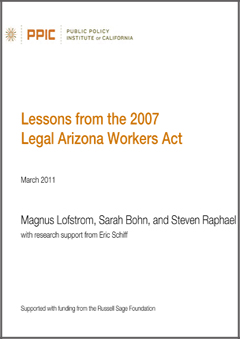E-Verify in Arizona: Lessons from the Legal Arizona Workers Act
 Arizona reduced the number of unauthorized immigrants in the state by requiring employers to verify workers’ legal status with the national E-Verify system. But while the Legal Arizona Workers Act—which took effect in 2008— has so far achieved this intended goal, it has also had unintended results. It has pushed a substantial number of unauthorized immigrants into informal employment, as measured by increasing rates of self-employment. These are the results of a study released by the Public Policy Institute of California (PPIC) with funding from the Russell Sage Foundation.
Arizona reduced the number of unauthorized immigrants in the state by requiring employers to verify workers’ legal status with the national E-Verify system. But while the Legal Arizona Workers Act—which took effect in 2008— has so far achieved this intended goal, it has also had unintended results. It has pushed a substantial number of unauthorized immigrants into informal employment, as measured by increasing rates of self-employment. These are the results of a study released by the Public Policy Institute of California (PPIC) with funding from the Russell Sage Foundation.
The study estimates that Arizona’s population of unauthorized immigrants of working age fell by about 17 percent, or about 92,000 people, from 2008 to 2009 as a result of the law. This decline is greater than those in comparison states—including California—during the recent recession.
Arizona’s law is the most restrictive and comprehensive effort by a state so far to reduce employment of unauthorized workers—those in the United States without proper documentation. It requires that a licensed business use the national online E-Verify database to confirm that newly hired employees are legally authorized to work and imposes sanctions on an employer who continues to hire them. Because the law excludes independent contractors from its definition of an employee, self-employment or other less formal arrangements are ways to avoid E-Verify.
Using an analysis of U.S. Census Bureau data, the PPIC study finds that as a result of the law, employment fell 11 percentage points among less-educated Hispanics in Arizona who aren’t citizens—a high proportion of whom are unauthorized immigrants. This is a decline of about 56,000 wage and salary workers in the state. At the same time, self-employment in this group increased by 8 percentage points, or about 25,000 workers.
"Arizona’s experience so far contains important lessons for other states considering similar laws,” says Magnus Lofstrom, PPIC research fellow, who co-authored the study with PPIC research fellow Sarah Bohn and Steven Raphael, UC Berkeley professor of public policy and PPIC adjunct fellow.
